How Long Do You Cook A Soft Boiled Duck Egg
You probably haven't noticed, but salted duck egg yolks are all the rage right now in Chinese cooking, and we've done many, many months-long experiments and recipe tests at home to finally be able to share this recipe for the perfect salted duck eggs!
Adding a Little Richness
Traditionally, salted duck eggs are served with rice porridge (congee) for breakfast. But the real treat for many is the yolk—salted duck egg yolks are often used in mooncakes, pastries, and rice dumplings ( zongzi ).
They add extra richness, saltiness, and decadence to any dish, making them a real favorite for restaurant chefs. In recent years, chefs have started integrating salted duck egg yolks as coatings for shredded potatoes, fried pumpkin, shrimp, and crab. I've even seen it in fried rice!
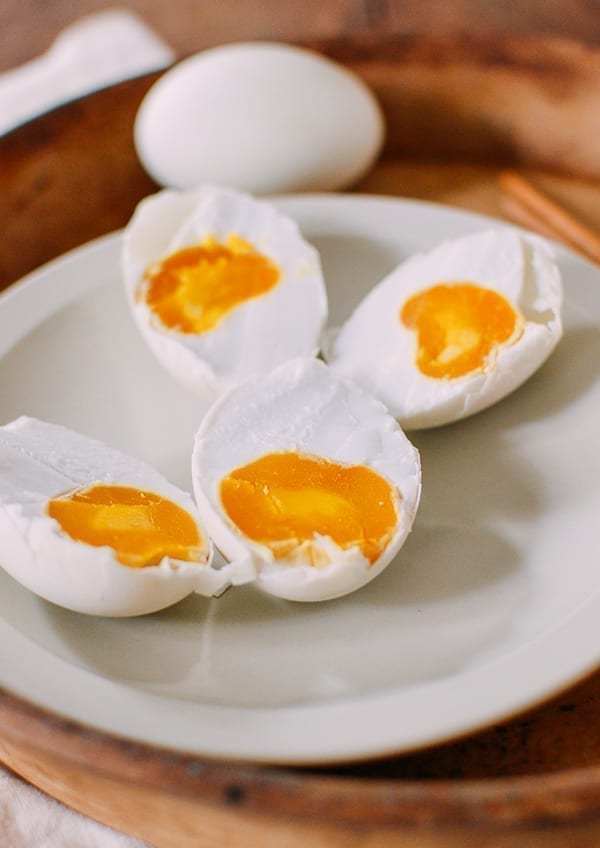
What does a salted duck egg taste like?
For those of you who've never had a salted duck egg, the egg white tastes similar to a boiled chicken egg white, but it's saltier and not as dense.
In general, though, the focus is more on the yolk, which tastes like a soft mashed roasted chestnut, with a salty and rich umami flavor.
Others enjoy dollops of caviar, but some of us enjoy chomping down on salted duck egg yolks!
Why homemade?
Over the years, it has been a real challenge to find tasty, reasonably priced, and high quality salted duck eggs here in the U.S.
Two common options are: vacuum-packed salted duck egg yolks—neon and lacking in flavor, but better than nothing.
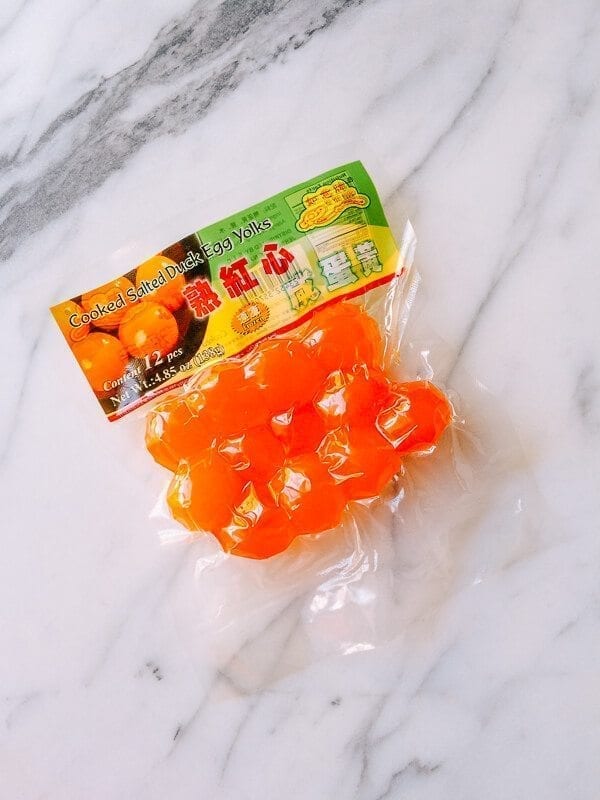
The other is the vacuum-packed cooked whole duck egg, but buying them is like buying lottery tickets—you never seem to win.
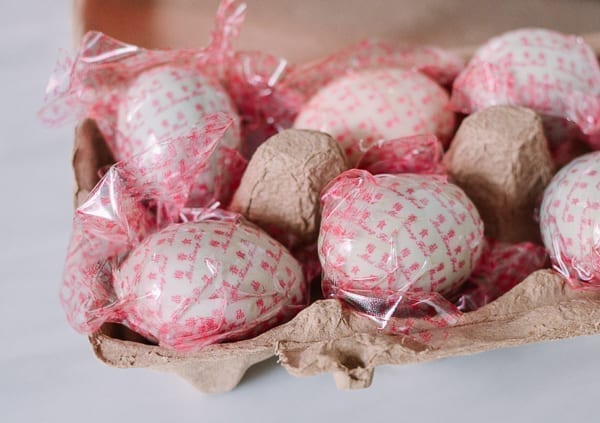
Look at the purchased ones next to what I made (ours is on the left, the store-bought is on the right).
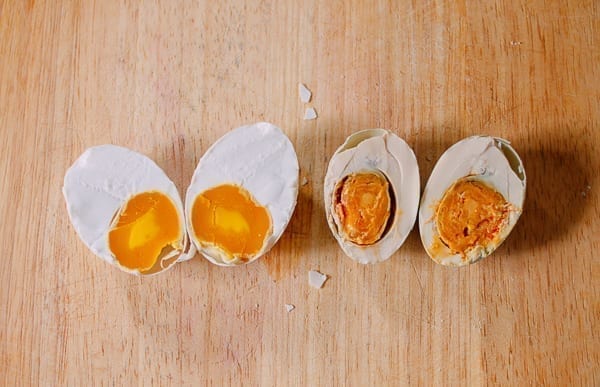
The store-bought duck eggs (these are well within their expiration date of February 2020, by the way) are greenish-gray in color and unpleasant looking. Their flavor is also lacking and the fact that they were industrially made doesn't make me feel any better about using them!
I realized that I have to keep making my own, and that's why I've been vigorously testing recipes for months! There are other recipes out there on the internet, but they yield varying results that I've never really been happy with. As you can see from the picture below, I'm now VERY happy to say we've finally cracked the code.
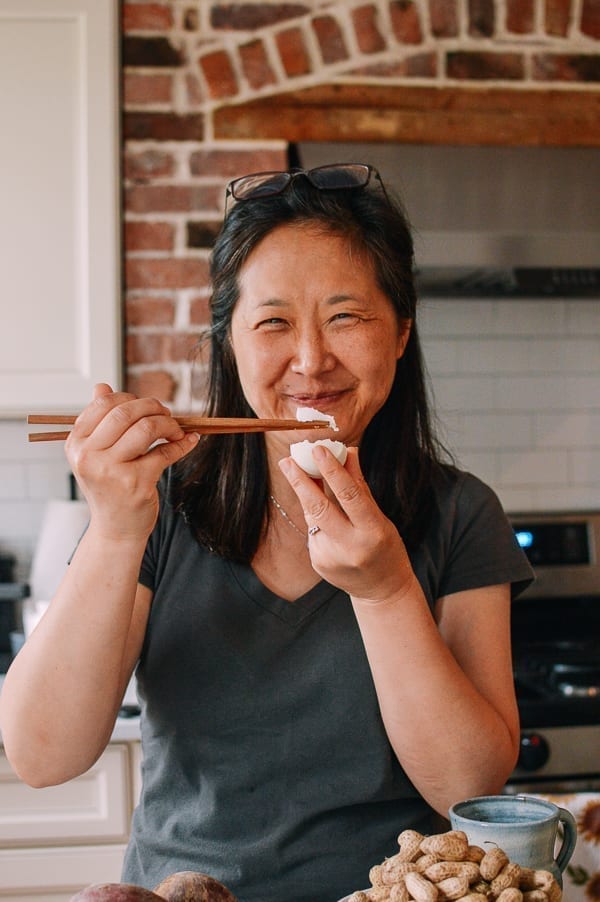
How to Make Salted Duck Eggs with Our Step-by-Step Recipe
Our salted duck egg recipe has several steps and a fair amount of detail, but we've done all the work for you by testing the recipe––all you have to do is follow the instructions! The hardest part is waiting for the eggs to mature.
The most effort you'll put in is on the day of brining, so it's best to do it when you're at home with a good book or movie. From there, brining requires anywhere from 30-60 days––mine took 60 days. I wanted a delicate flavor, so I didn't want to use a lot of salt, which makes it take a little longer. But you reap what you sow, right?
Too much salt will make the egg whites too salty before the salt gets to the yolk, making the egg white inedible (we've experienced that across multiple experiments). To avoid a long wait time, my suggestion is to make a batch once every couple of months so they end up waiting for you instead of you waiting for them! For that first batch, you'll just have to be patient!
So how do you know they're ready? There's a point during the salting process where I usually cook one egg to test the batch (you just boil them in the shell; instructions below).
The indications of a good salted duck egg are a solid white that's not too salty and a perfect egg yolk that's oily, golden orange in color, and again, salty but not too salty. Of course, there's a subjective aspect to this, so you may have to troubleshoot a little bit to get it to your liking, but this recipe is for a "standard"—delicious—salted duck egg.
Where can I find duck eggs?
If you can't find fresh duck eggs in your local markets, try searching for local farmers. To be fair, it's easier said than done for most. We live in a pretty rural area in New Jersey, and I found a lady nearby who keeps two chickens and two ducks as pets. She doesn't eat eggs and sells them to neighbors! What luck, right? They can also be found fresh in certain Asian markets.
As a last resort, you can use free-range chicken eggs. The best eggs for making salted eggs are the ones with super dark yellow, almost orange yolks (go for pastured eggs. They're not only tastier, but better for farmers, birds, and for the environment!).
Salted Duck Eggs: Recipe Instructions
Before you get started, there are a few tips to remember for successful salted duck eggs:
- If using free-range chicken eggs, remember to reduce the brining duration by at least 10 days, because they're smaller and require less time for the salt to penetrate.
- Eggs break easily, so handle them with care during the entire process; any micro-cracks will ruin your salted eggs.
- This is a morning recipe. You should only use early morning sun to sunbathe the eggs (Yes, the eggs need to sunbathe. I know, sounds crazy). This morning's temperature was around 50-55 degrees F. I left the eggs in the early morning sun for 3-4 hours. If the temperature is higher, reduce the sunbathing time to 1-2 hours.
- All utensils or containers must, must be clean and grease-free. Boil your cookware and dishware (glass only) ahead of time if needed. You may also use a heavy-duty, air-tight, food-grade, BPA-free plastic container, but I prefer glass.
- The salt water must be boiled, do not use "raw" water.
- You can also get fancy by adding a couple of star anise, a stick of cinnamon, and 2 tablespoons of Sichuan peppercorns, but they must be boiled in the saltwater and cooled prior to adding (we include this step in the recipe below if you'd like to use aromatics).
- The use of Chinese baijiu (白酒), a strong clear liquor, is important, as it brings out the natural oils in the egg. Whiskey is a good substitute if you have trouble finding baijiu, which still isn't that widely available outside of China.
- Once the duck eggs have reached an ideal state, remove them from the salt water to avoid them becoming too salty. You can store them in a sealed container in the refrigerator for 1-2 months.
- Start testing after 30 days, depending on the egg size. Small eggs takes less time.
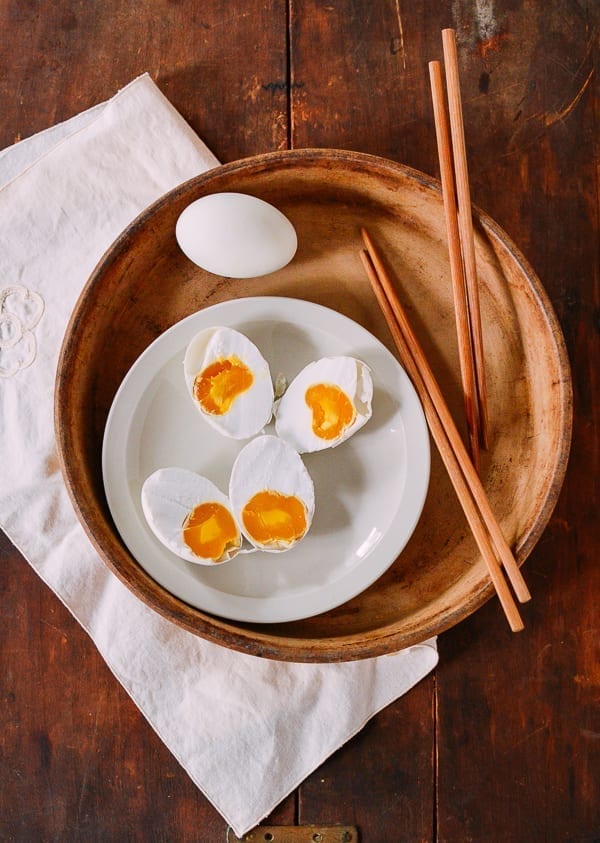
On to the recipe!
First, wash the eggs in plain water. I buy my duck eggs directly from a local neighbor, so I like to make sure they're thoroughly clean.
Carefully arrange the eggs in the container they'll be brined in. Add enough water to cover the eggs so they are completely submerged. This step is to find out how much water you need, so do not discard the water.
Carefully remove the eggs from the water, and let them sunbathe for 3-4 hours in the early morning sun; reduce the sunbathing time to 1-2 hours if the temperature is higher than 65 degrees F (18 degrees C), but it should still be early morning sun! Turn the eggs every hour. The late morning hot sun may result in cracked eggs during the salting process.
While the eggs are working on their tans, transfer the water in the container to a clean pot—I used about 1 quart of water (if you're using aromatics, it's time to add them now!). Stir in ¼ cup salt and bring to a boil. Turn off the heat, cover, and cool completely to room temperature. In the meantime, take the container, and let it dry out completely in the sun.
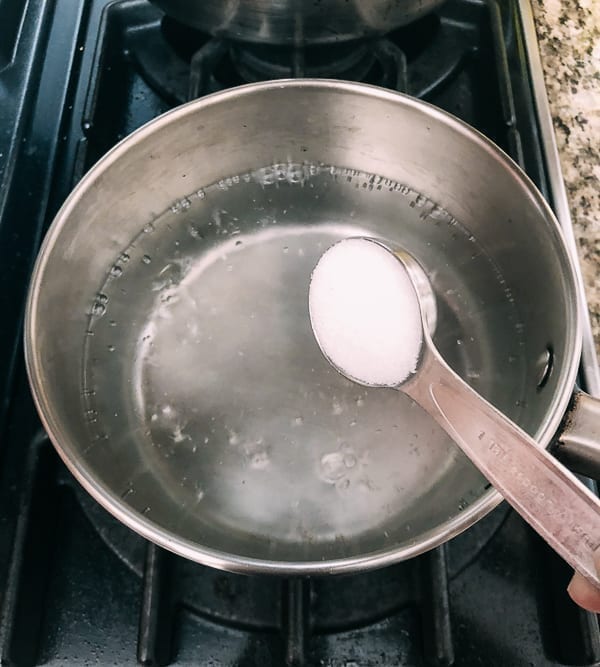
Next, pour ½ cup of Chinese baijiu (or whiskey) into a large bowl.
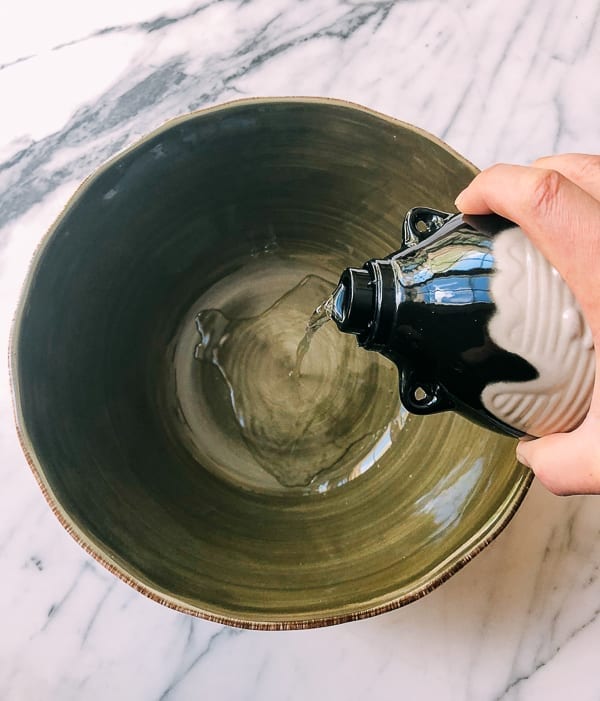
Carefully take the eggs and turn them over in the baijiu. ½ cup of baijiu isn't enough to submerge them, so you'll have to roll them around every 10 minutes so they are soaking at all times. Soak the eggs in the baijiu for 1 hour. I do it this way rather than submerging them in liquor so as not to unnecessarily waste any of our precious imported bai jiu!
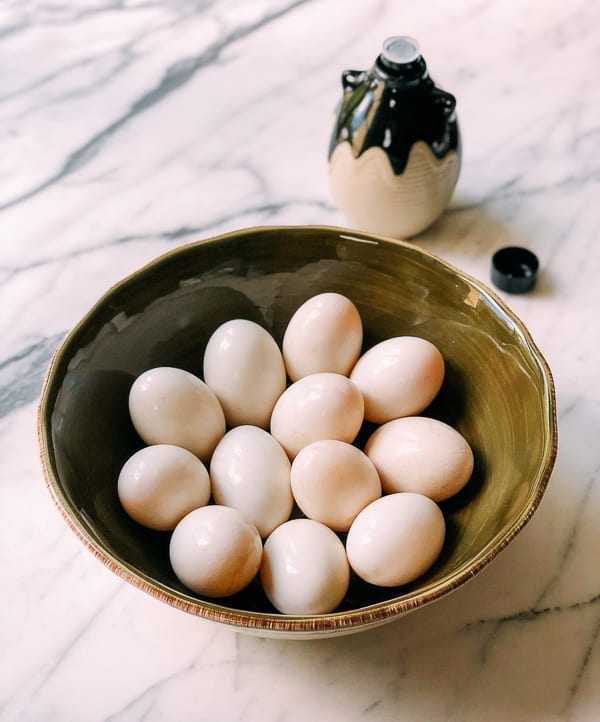
Once the salt water is completely cooled and your container is dry, add the eggs back to the glass container one by one. Pour in the baijiu used to soak the eggs along with the cooled salt water. Arrange the eggs with a clean utensil to make sure they are all completely submerged.
Cover tightly so that the container is thoroughly sealed, and store in a cool, dry place for 30 to 60 days. Egg sizes vary, so brining time will vary as well. You can cook one after 30 days to see if it's done. Try again in 10-15 days if it's not quite there. It helps to label the jar with the date!
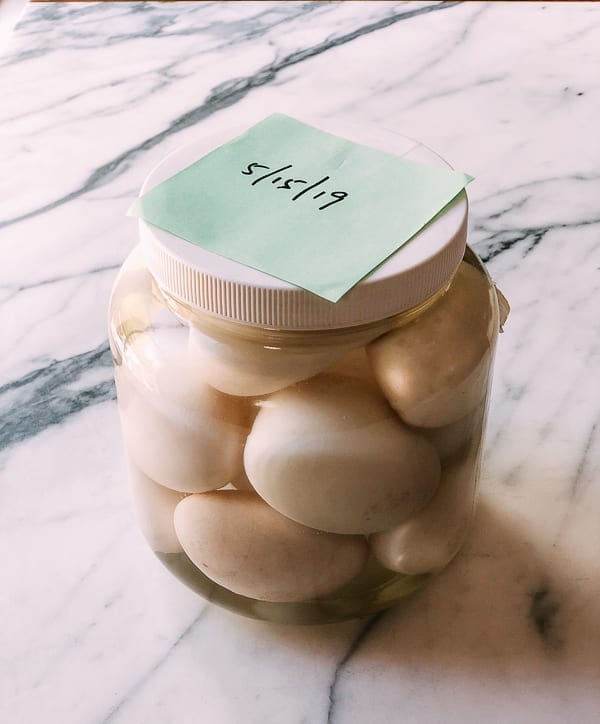
To cook the duck eggs for your morning congee and other uses, submerge the salted duck egg in a pot of boiling water water, and cook over medium heat for 10-12 minutes.
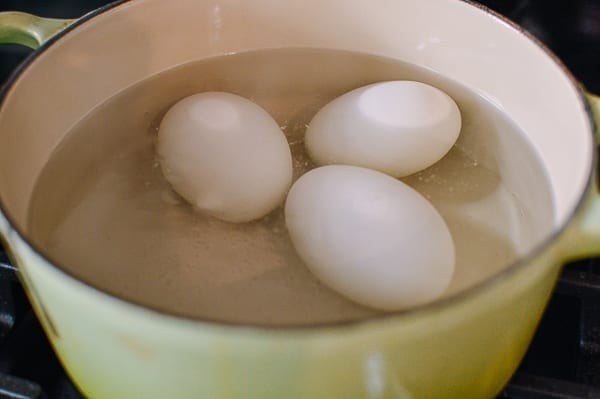
To cut the egg open, pierce the egg with the sharp tip of a knife…
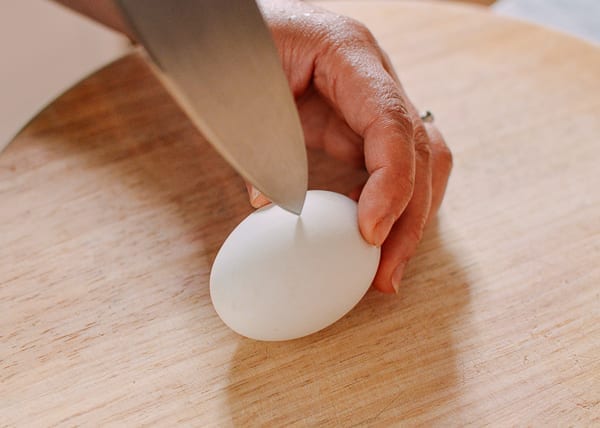
And then in one quick slicing motion, cut the egg in half.
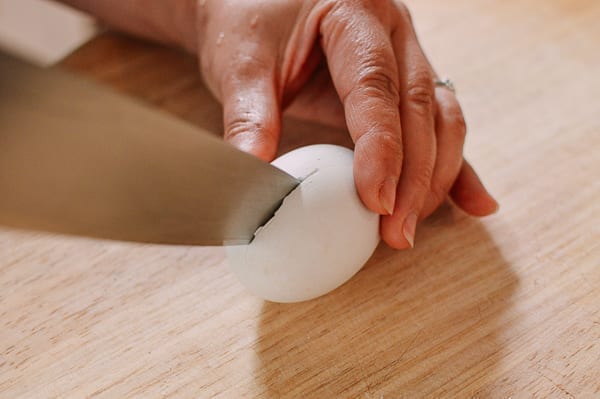
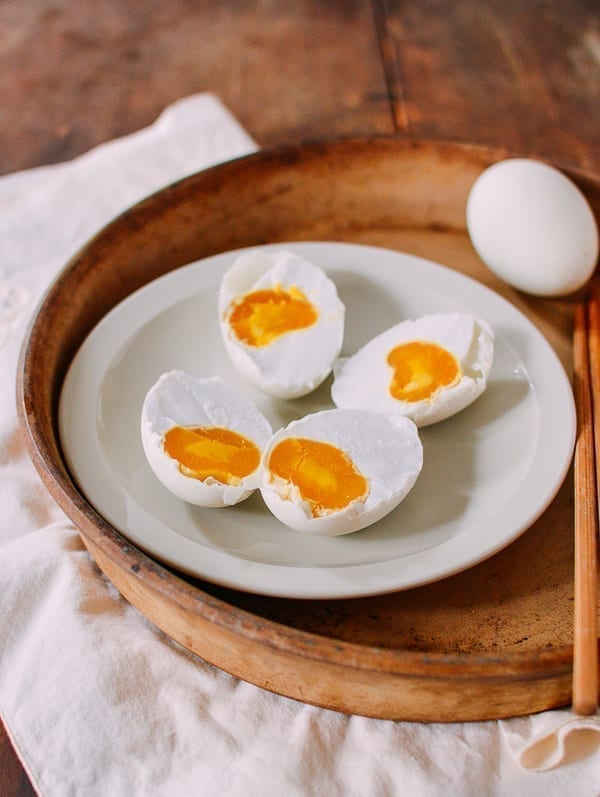
Important Note!
Once the duck eggs are fully salted and done brining, store them uncovered in the fridge, and use them or cook them within 1-2 weeks.
If you don't have plans for immediate use, hard boil them before storing them in the refrigerator for up to 1 month.
Do not keep them raw and un-brined in an enclosed container, or gas may build up in the container and they will go bad.
See below for ways to use them!
What dishes can I add salted duck eggs to?
After you learn to make your own salted duck eggs, the world is your oyster! Here are some recipes you can try them with: Lotus Mooncakes with Egg Yolks and Cantonese-Style Zongzi .
You can also make Salted Duck Egg Yolk Sauce, or simply enjoy these eggs with congee or pao fan.
Enjoy this classic, traditional Chinese recipe!
- 12 duck eggs
- 1 quart water (about 1 L, depending on the size of your container and the size of your eggs)
- 1/4 cup sea salt (70g)
- 1/2 cup baijiu (120ml, 55 proof Chinese hard liquor; can substitute whiskey)
-
First, wash the eggs in plain water until clean.
-
Carefully arrange the eggs in the container they'll be brined in. Add enough water to cover the eggs so they are completely submerged. This step is to find out how much water you need, so do not discard the water.
-
Carefully remove the eggs from the water, and let them sunbathe for 3-4 hours in the early morning sun; reduce the sunbathing time to 1-2 hours if the temperature is higher than 65F, but it should still be early morning sun! Turn the eggs every hour. The late morning hot sun may result in cracked eggs during the salting process.
-
Meanwhile, transfer the water in the container to a clean pot—I used about 1 quart of water (if you're using aromatics, it's time to add them now!). Stir in ¼ cup salt and bring to a boil. Turn off the heat, cover, and cool completely to room temperature. In the meantime, take the container, and let it dry out completely in the sun.
-
Pour ½ cup of Chinese baijiu (or whiskey) into a large bowl, carefully take the eggs, and turn them over in the baijiu. ½ cup of baijiu isn't enough to submerge them, so you'll have to roll them around every 10 minutes so they are soaking at all times. Soak the eggs in the baijiu for 1 hour.
-
Once the salt water is completely cooled and your container is dry, add the eggs back to the glass container one by one. Pour in the baijiu used to soak the eggs along with the cooled salt water. Arrange the eggs with a clean utensil to make sure they are all completely submerged.
-
Cover tightly so that the container is thoroughly sealed, and store in a cool, dry place for 30 to 60 days. Egg sizes vary, so brining time will vary as well. You can cook one after 30 days to see if it's done. Try again in 10-15 days if it's not quite there!
-
To cook the duck eggs for your morning congee and other uses, submerge the salted duck egg in a pot of boiling water, and cook over medium heat for 10-12 minutes.
- If using free-range chicken eggs, remember to reduce the brining duration by at least 10 days, because they're smaller and require less time for the salt to penetrate.
- Eggs break easily, so handle them with care during the entire process; any micro-cracks will ruin your salted eggs.
- This is a morning recipe. You should only use early morning sun to sunbathe the eggs (yes, the eggs need to sunbathe. Sounds crazy!). This morning's temperature was around 50-55 degrees F. I left the eggs in the early morning sun for 3-4 hours. If the temperature is higher, reduce the sunbathing time to 1-2 hours.
- All utensils or containers must, must be clean and grease-free. Boil your cookware and dishware (glass only) ahead of time if needed. You may also use a heavy-duty, air-tight plastic container.
- The salt water must be boiled, do not use unboiled water.
- You can also get fancy by adding a couple of star anise, a stick of cinnamon, and 2 tablespoons of Sichuan peppercorns, but they must be boiled in the saltwater and cooled prior to adding.
- The use of Chinese baijiu (白酒), a strong clear liquor, is important, as it brings out the natural oils in the egg. Whiskey is a good substitute if you have trouble finding baijiu, which still isn't that widely available outside of China.
- Start testing after 30 days, depending on the egg size. Small eggs takes less time.
- Once the duck eggs reached the ideal state, remove them from the salt water to avoid them becoming too salty. Keep them in an uncovered container, and use/cook them within 1-2 weeks. Hard-boiled duck eggs still in the shell can be stored in the refrigerator for up to 1 month.
How Long Do You Cook A Soft Boiled Duck Egg
Source: https://thewoksoflife.com/salted-duck-eggs/
Posted by: meiercambactint.blogspot.com

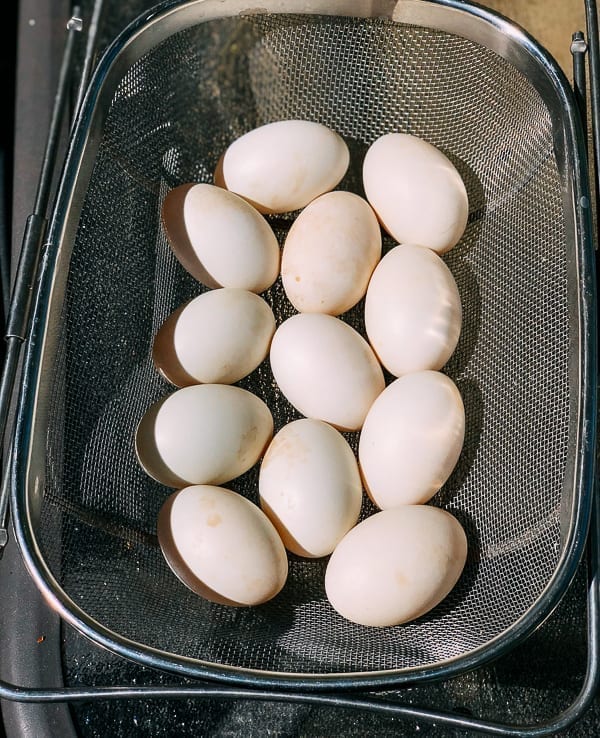
0 Response to "How Long Do You Cook A Soft Boiled Duck Egg"
Post a Comment